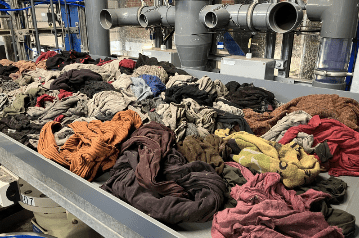Avantium N.V., a leader in renewable and circular polymer materials, has found an important solution for recycling polycotton waste textiles.
Developed in collaboration with the Industrial Sustainable Chemistry group at the University of Amsterdam, which is led by Avantium Chief Technology Officer Gert-Jan Gruter, Avantium has developed a patented technology to break down the cotton in polycotton fabric into glucose using hydrochloric acid, while leaving the polyester intact. This allows the polyester to be fully recycled, facilitating fiber-to-fiber recycling.
Additionally, the cotton glucose can be utilized as feedstock for industrial applications. This innovative method, today published in Nature Communications, is the first effective method for recycling both polyester and cotton components with high efficiency. This marks a significant advancement in textile recycling, addressing the growing environmental challenge of textile waste.
Avantium is a frontrunner in developing innovative technologies for producing chemicals and materials from sustainable carbon feedstocks, like plant-derived carbon or CO2. One such technology, Dawn Technology, converts non-food plant-based feedstock into glucose and lignin, proven in its pilot plant in Delfzijl (the Netherlands).
This glucose can be used in chemical and fermentation processes for diverse products such as monomers for bio-based plastics. After several successful trials in its laboratories, Avantium has been using its Dawn Technology pilot plant to test the viability of breaking down and recycling post-consumer polycotton waste textiles at a larger scale.
By using highly concentrated HCl on polycotton waste, the cotton cellulose was fully hydrolyzed into glucose, which can be easily separated from the solid polyester residue. This enables the complete recycling of polyester and the use of cotton-derived glucose for a wide range of industrial applications, including polymers, resins and solvents.
The resulting glucose can for example be used by Avantium to produce its lead product 2,5-furandicarboxylic acid (FDCA).
The trials at Avantium’s Dawn pilot plant have shown high glucose yields from polycotton waste, indicating scalability and cost-effectiveness. This method is therefore the first viable process to effectively recycle both polyester and cotton fractions in high yields.
With global textile production expected to reach 149 million tons by 2030 and a recycling rate of less than 1%, Avantium’s technology offers a sustainable solution for a circular, low-carbon textile industry and aligns with new regulations that make textile producers responsible for waste management.
Avantium supported this groundbreaking project by hosting PhD students from the Industrial Sustainable Chemistry research group of the University of Amsterdam in its laboratories and its Dawn pilot plant in Delfzijl. The first author of the paper, PhD student Nienke Leenders, works on secondment at Avantium.
Avantium Chief Technology Officer Gert-Jan Gruter states: “We are excited about this groundbreaking solution, which is not only providing feedstock for our own FDCA and PEF technology and aligns with our environmental objectives but also marks a crucial advancement towards achieving a circular economy.
At Avantium, we are committed to perfecting this technology in collaboration with partners and broadening its application to address the global textile waste problem. Simultaneously, we aim to supply non-food glucose to support the large-scale transition toward a bio-based economy.”

